- Home
- Tim LaHaye
The Rapture: Evil Advances / Before They Were Left Behind Page 13
The Rapture: Evil Advances / Before They Were Left Behind Read online
Page 13
The windshield steamed over as they sat and talked. Irene had prayed, including for Rayford’s safety and for his soul.
When she finished, Raymie added, “And thanks that he’s coming to church with us Sunday.”
“That means a lot to you, doesn’t it?” Irene said.
“ ’Course. Dad just doesn’t seem happy anymore. Plus, I want to be sure he’s going to heaven when he dies.”
“Me too.”
They arrived home later than Irene liked on a school night, so she pushed Raymie to get to bed. When she checked on him a few minutes later, he was under the covers. “You’re not wearing socks, are you?” she said.
He sighed. “Yeah.”
“You know you’ve got to let your—”
“Feet breathe, yeah, I know. But my feet are so cold. Just let me wear them for a little while, and I’ll kick them off later.”
“What if you fall asleep? I don’t want to have to come in here and pull them off you in the middle of the night.”
“Mom, I’m not going to die if my feet don’t breathe.”
“Just try to remember to take them off, once you’ve warmed up.”
Irene prayed with Raymie again, and as she headed to the lonely master bedroom, she questioned why she was so obsessed over his wearing socks to bed. Feet didn’t really breathe, and what was the harm? Had her parents not allowed her to do the same? Where had she gotten that old wives’ tale? She could only hope that was the biggest issue she ever had with the boy. Fat chance.
As Irene slid between the cool sheets, she wondered if she too should have socks on. She lay there on her back, silently running through her prayer list. But her mind kept coming back to Rayford. He had been her life for almost as long as she could remember, but things were clearly not the same.
Could he be having an affair with this Durham girl? And if he was, what should Irene do?
She still didn’t want to think about it, but she couldn’t help it. She would not be walked on, not be treated that way. But if there was something she could be doing differently or better, she hoped God would tell her what it was. In the meantime, Irene would just keep praying for Rayford. She didn’t want to lose him, particularly to another woman. But above all, she didn’t want to see him lost to the Kingdom of God.
Rayford Steele was a conflicted man. During the O’Hare-to-Heathrow preflight preparation he began to feel less than the professional he had always been. He was not perfect; he knew that. But he was one high-level accomplished pilot, supremely confident in his ability to safely transport hundreds of people thousands of miles in a craft worth millions of dollars. He was well paid and respected, and he believed he deserved both.
The problem was, Rayford had never been this distracted before a flight. He’d always had the ability to compartmentalize the various areas of his life. Irene knew better than to try to call him between the time he left for the airport and when he called her upon arrival at his destination. Only a couple of times during their long marriage had she violated that. Both times she had caught him in the car on the way to the airport, and she was just telling him she missed him or loved him or would be thinking of him. And both times he had realized he sounded distracted and had apologized, but he was—in essence—getting his game face on.
Preflight routine was indeed routine, but it was nothing to sleepwalk through, and he had to start thinking of the myriad checklists and protocols so necessary to safety and efficient flight operation. He was not just the pilot; he was the captain, responsible for everything, and he would have to answer for anything that went wrong.
Rayford loved the responsibility and his ability to focus on it. He was known as a nice, friendly guy, a captain that people enjoyed flying with. His first officer tonight would be Christopher Smith, an earthy, down-home kind of guy he enjoyed chatting with. Chris had a couple of young sons he liked to talk about, and he also seemed to get a kick out of reverting to his youthful colloquial language. Rayford and Chris Smith had flown a good bit together and had even been through a dangerous incident together, but Rayford had to admit that they had never bonded to the point where Rayford even knew where that accent had come from. Not quite Southern. But country. Could have been southern Indiana or even Oklahoma.
Rayford knew Chris had the skills to become a captain but perhaps not the demeanor or character. If any first officer of Rayford’s ever violated protocol, like trying to sneak a nap during a flight or exhibiting a bit of selfishness, it would be Chris. Not to the point that he required more than a reminder rather than an official reprimand, but enough that Rayford had to wonder about his future. And Chris was an ambitious guy. Rayford couldn’t figure it. He would’ve thought a guy who had his sights set on the top job would do everything in his power to show everybody he was dead serious and committed to it.
Hattie had informed Rayford that one of his favorite attendants would be aboard. Antonio Salazar was a veteran and a passenger favorite. A family man, he was funny and entertaining and helpful, seemingly a ball of indefatigable energy with a great smile. He was just one of those types who appeared happiest when busy and helping people. Tony had actually turned down a promotion to senior flight attendant, citing his pleasure with his current role as well as family responsibilities that made him want more control over his own schedule.
Rayford’s problem this evening, however, was the new senior flight attendant herself, the leggy young woman who had ridden from Des Plaines to O’Hare with him. Their flirtation dance had accelerated, and something had to give. Either Rayford would have to nip it in the bud and tell Hattie it simply wasn’t wise and wasn’t going to work—the old “I really can’t do this to my loyal wife and kids” tack—or he was going to have to quit pretending he didn’t notice her every look, touch, and remark.
The conflict, then, was not really over whether he was going to pursue this out-of-bounds relationship. Rather it was tension between knowing full well that this was his intention—especially since they would have a couple of days in London with time and distance from his conscience (which he had apparently left at home)—and his need to keep his professional mind on his business.
While boarding and greeting the crew and getting himself situated, Rayford knew he should be in full preflight mode, eyes and mind on the task. But he was formulating his approach to Hattie. She seemed on high alert, excitedly talking about her new role as senior attendant, yet giving him other obvious signals that she knew they were headed toward the inevitable point of no return.
Even while lugging his boxy flight attaché case, shedding his coat, greeting Antonio and the others, and finding Chris already in the cockpit, Rayford had to admit his mind was elsewhere. Salazar had been busy in the galley when Rayford moved through, and the smaller man flashed a smile and shook the captain’s hand warmly.
“Hey, Tony,” Rayford said. “Good to see you.”
“Likewise. Diet Coke with a lime or are you ready for some coffee?”
“Oh, thanks,” Rayford said, “but I think Miss Durham’s already on it.”
“We’re excited about her, sir. She’s going to be a good senior. And she credits you for being a great mentor.”
“Really?” Rayford said, trying to appear pleasantly surprised.
Hattie was accomplished at hiding her feelings for Rayford from the rest of the crew. She always referred to him as the captain or Captain Steele or the pilot, never using his first name. And she didn’t ogle him on board as she did in the car or from across the table at a restaurant. How she was able to lightly touch him as they passed each other or when she delivered something to him in the cockpit without anyone else being the wiser, Rayford would never know.
Even now, when he finally settled in behind the controls and she brought him a Diet Coke, she shielded Christopher Smith’s view with her body as she leaned to hand Rayford the drink. Meanwhile, with her left hand she dragged a finger across his shoulder to the base of his neck. There was nothing but professionalism in their ton
es of voice and thus seemingly no suspicion aroused on anyone else’s part.
When she left the cockpit, Smith chortled, “Whoo, boy, that is one gorgeous young thing, ain’t she?”
“Miss Durham?” Rayford said. “She is attractive.”
“Attractive?” Smith said, adding a crude remark about his own fantasies concerning her.
“Pretty young for you, wouldn’t you say, Chris?”
“May it never be so, Cap’n. Tell me you’d turn down a chance with her.”
Rayford pursed his lips and shook his head, as if admonishing a student. “Let’s have a little class, man. She’s not much more than a child. And you, a family man.”
“Well, I’m not dead, and I’m sure not blind.”
“Back to business there, cowboy.”
SEVENTEEN
IRENE STEELE was not the type of person that bolted straight up in bed, regardless of what she felt or heard. Rayford might sit up or even creep out to see what had awakened them, but Irene tended to freeze if something startled her awake.
And that’s what happened this night. She’d had trouble falling asleep, as usual when Rayford was away. But soon she was soundly out, hands clasped under her cheek as she lay on her side.
What woke her was a shout so loud that it was as if someone were in the room. Clear as day came the piercing precision of every syllable, and her eyes popped open, her heart resounding against her ribs.
“IRENE STEELE!”
Liem, a graduate school student, had worked in the Jakarta, Indonesia, Sunrise Crematorium throughout his university tenure. In fewer than three years he had risen to the point that he was responsible for the actual burning of corpses.
The hardest part of the job was the paperwork. Obviously one had to be sure he was cremating the right body and following whatever religious instructions had been outlined.
The modern ovens, which each held one standard-size cremation coffin and remains, burned at more than 1,650 degrees Fahrenheit and consumed approximately 175 pounds every thirty minutes.
Liem left everything on the coffins except the nameplates, as ornaments and fittings were combustible plastic. Once he was certain the paperwork matched the corpse, he would slide the coffin out of storage and onto an oversized steel gurney, which he would then roll to the oven door. The coffin was then transferred to the top level of the chamber, the door secured, and the burners turned to maximum.
During the process, the heavier bones and calcium deposits would fall through openings to the lower chamber. When what was left had cooled, Liem would use a magnet to separate surgical pins, nails, screws, or other artificial elements. He would then grind the final residue into a fine powder and deposit it in a decorative urn selected by the family.
Liem was cremating the body of a missionary pilot whose religion was designated Christian. Without incident, he made certain of the paperwork, slid the coffin into the chamber, adjusted the settings, and left for his late-morning lunch break.
Upon his return just after noon, Liem noted that the burning was finished and the cooling had begun. But when the remains should have been cool enough to begin the magnetic procedure, Liem was stunned to find nothing in the lower chamber. His brow knit with confusion, he rushed to his supervisor.
“Show me the paperwork,” the man said. “Did the coffin feel full?”
“Absolutely. I know the difference.”
“Then what happened in the process that kept the bones and calcium from dropping?”
“No idea, sir.”
They checked the upper chamber and found only the ashes and dust from the coffin and plastic.
“Liem, you were mistaken. That coffin had to have been empty.”
“How could that be? That has never happened before. And no . . . no, sir. I clearly recall that coffin being difficult to get rolling from the gurney. It was not empty.”
“Liem, see for yourself. No residue of human remains. What will we tell the family?”
Liem was terrified, though he could not imagine he bore responsibility for this. “I will open every coffin before burning it from now on. But what could have caused this?”
“You said you took a break. Do you suspect body snatchers?”
“I cannot imagine. That is the stuff of horror movies. How would anyone get in here to steal bodies? And I put the coffin in the oven myself. Someone would have had to remove it, take the body, and replace the coffin into the fire.”
“How many more do you have today?”
“Four.”
“Check them now.”
Liem found all the paperwork and began comparing it with the form affixed to each coffin. The first body, a local whose family had checked None for religion, was there. The second, a young female exchange student from Canada, had Unknown listed under religion.
Another Christian was supposedly in the third coffin, but as soon as Liem slid it onto the gurney, where he would have room to open it, he could tell it was empty. “We’ve got no body here either, sir.”
“How do you know?”
When the lid opened, the supervisor gasped. Only the clothes remained. “This suit was buttoned back up after the body was stolen. What kind of a sick—?”
Liem’s cell phone rang, and he took a call from his sister.
“Turn on the news,” she said.
“We don’t have a television down here.”
“Find one and turn it on.”
“Maybe after my shift.”
“Trust me, Liem—do it now!”
Liem hung up and told his boss that something big was on the news.
“Unless it has something to do with missing bodies, we don’t have time for that, Liem. We’re in big trouble.”
The door burst open at the end of the corridor. “You guys hear what’s going on? Get up here!”
Liem and his boss ran up the stairs and joined a scrum of fellow workers crowded around a TV. News footage showed a funeral parlor with coffins empty, save for the clothes and artificial body parts of the deceased. Panic broke out and people rioted. A fresh story, fed from a network TV station in California, showed an anchorman disappear from his clothes on camera as the nine o’clock news began. His coanchor frantically pulled the clothes from the man’s chair, screaming.
Liem, unable to get his mind around any of this, staggered out into the noonday sun and was struck to see the traffic hopelessly gridlocked. From his first moment in Jakarta years ago, he had heard the cacophony of car horns as he heard them now. And while the traffic had always been insane, it somehow kept moving. Even when cars brushed against each other in the roundabouts, people had kept their heads and managed to pick their way through.
But now no one was moving. Liem walked into the street and joined others who peered speechlessly into driverless cars—cars with engines running, radios on, even air-conditioning humming. But in each no one sat behind the wheel. Shoes and socks lay on the floor. Pants on the seat. Shirts on the back of the seat. Eyeglasses, hearing aids, jewelry—all still there.
From one of the radios Liem heard a horror-stricken reporter say that this sudden disappearance had struck all over the globe at the same time and that experts were already predicting the toll would rise to more than a billion. Other major cities where this phenomenon had occurred in broad daylight, including some during the afternoon rush hour, saw traffic disasters just like this one.
Liem slapped himself to be certain he was not dreaming. This was a living nightmare.
In cities where the disappearances had happened in the middle of the night, those left behind were awakened by frantic phone calls from loved ones in other time zones. Soon the modes of communication were hopelessly jammed as the biggest news story in history swept the globe.
For an instant, Irene Steele had lain terrified, but before she could move even an inch she heard a loud trumpet blast and felt transported out of her bed, passing through the ceiling, the attic, the roof, and into the dark night sky. Strangely, though she had left her j
ewelry and nightgown, she did not feel naked, nor was she cold. Not for a second did she believe this was a dream or anything other than real. She was more in the moment than she had ever been in her life.
And there was Raymie, right next to her, as they soared.
“Is this it, Mom? Is this it? Somebody shouted my name!”
She could see clearly, even in the dark, and as they rose Irene saw millions rising with them from horizon to horizon. Oh, praise God! She would soon see Jesus!
But for now she was fixated on Raymie. She had known it was her son; she had recognized his face and his voice, though it had changed, and he was a full-grown man, over six feet tall with a clear face and chiseled features. She too had changed. Her face felt smoother, her skin taut. And while she still bore nicks and scars from various minor injuries over the years—even Jesus’ scars would still be visible, she knew—her body and tone reminded her of several years before, when she had been in her early thirties.
When she and Raymie reached the clouds, they slowed and were suspended there. Irene could not keep from grinning. She had always been afraid of heights, but here she was, higher than she’d ever been outside a plane, and she feared nothing. She wondered aloud where Jackie was, and suddenly, there she was, with Dooley and their grown-up child. They embraced and stared and shook their heads.
“It was you, you know,” Irene said. “You really led me to Christ.”
“Me too,” Dooley said. “I wonder if Pastor Billings—”
And there he was with them, embracing everyone, rejoicing. “I always wondered what this would feel like,” he said, looking half his age.
“Thank you for your faithful preaching and teaching,” Irene said.
It was then that she realized that there was no barrier between thought and action. “Raymie, it seems everything we think about happens instantly. I mentioned Jackie and here she is. Dooley mentioned the pastor, and here he is. It’s as if time has stood still and all of this is happening simultaneously.”

 Glorious Appearing: The End of Days
Glorious Appearing: The End of Days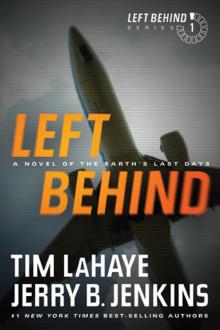 Left Behind: A Novel of the Earth's Last Days
Left Behind: A Novel of the Earth's Last Days Kingdom Come: The Final Victory
Kingdom Come: The Final Victory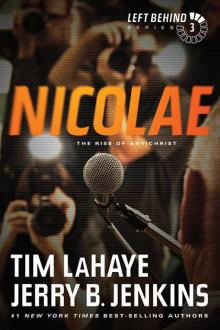 Nicolae: The Rise of Antichrist
Nicolae: The Rise of Antichrist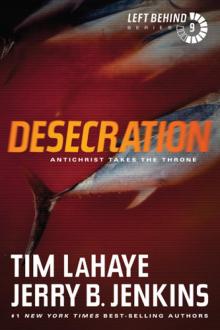 Desecration: Antichrist Takes the Throne
Desecration: Antichrist Takes the Throne Mark's Story: The Gospel According to Peter
Mark's Story: The Gospel According to Peter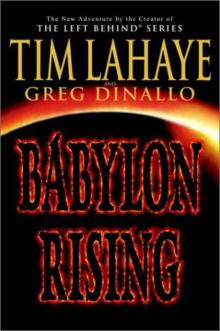 Babylon Rising
Babylon Rising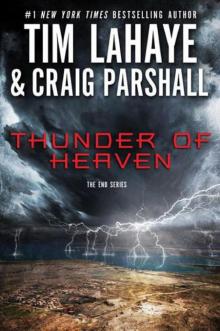 Thunder of Heaven: A Joshua Jordan Novel
Thunder of Heaven: A Joshua Jordan Novel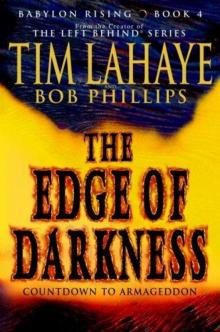 The Edge of Darkness
The Edge of Darkness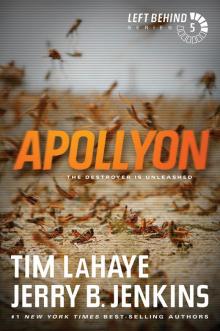 Apollyon: The Destroyer Is Unleashed
Apollyon: The Destroyer Is Unleashed Armageddon: The Cosmic Battle of the Ages
Armageddon: The Cosmic Battle of the Ages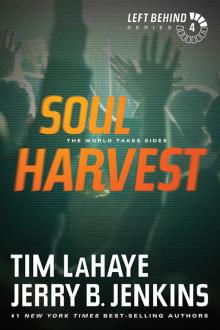 Soul Harvest: The World Takes Sides
Soul Harvest: The World Takes Sides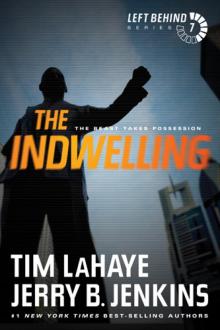 The Indwelling: The Beast Takes Possession
The Indwelling: The Beast Takes Possession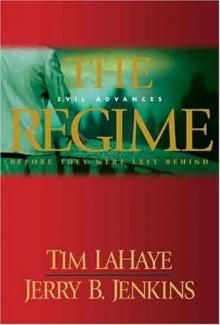 The Regime: Evil Advances
The Regime: Evil Advances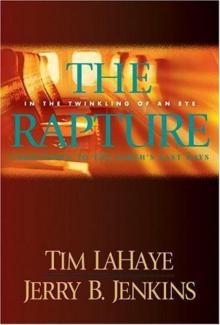 The Rapture: In the Twinkling of an Eye / Countdown to the Earth's Last Days
The Rapture: In the Twinkling of an Eye / Countdown to the Earth's Last Days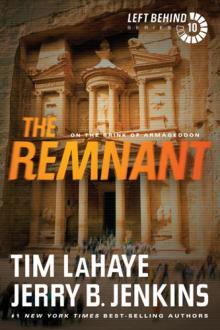 The Remnant: On the Brink of Armageddon
The Remnant: On the Brink of Armageddon John's Story: The Last Eyewitness
John's Story: The Last Eyewitness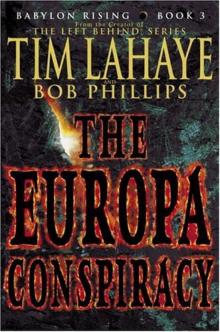 The Europa Conspiracy
The Europa Conspiracy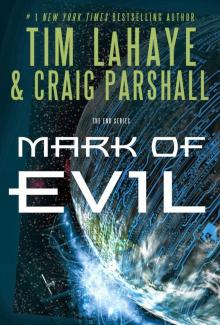 Mark of Evil
Mark of Evil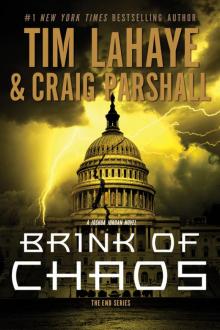 Brink of Chaos
Brink of Chaos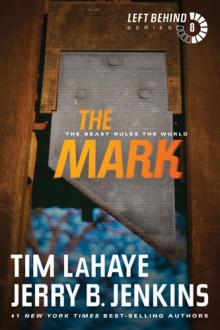 The Mark: The Beast Rules the World
The Mark: The Beast Rules the World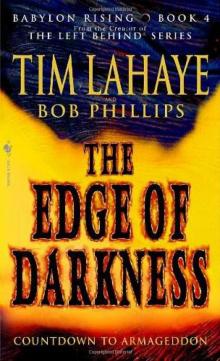 04 The Edge of Darkness
04 The Edge of Darkness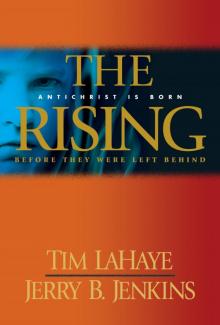 The Rising: Antichrist is Born / Before They Were Left Behind
The Rising: Antichrist is Born / Before They Were Left Behind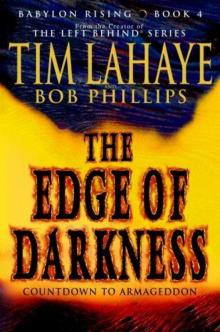 Babylon Rising: The Edge of Darkness
Babylon Rising: The Edge of Darkness 03 The Europa Conspiracy
03 The Europa Conspiracy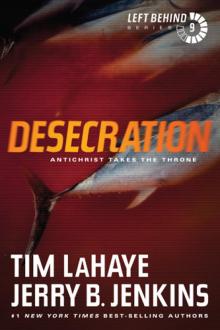 Desecration
Desecration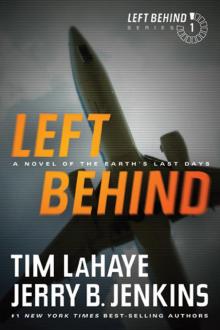 Left Behind
Left Behind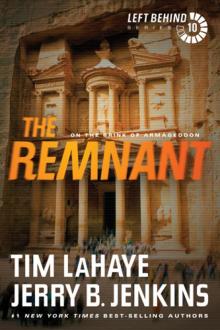 The Remnant
The Remnant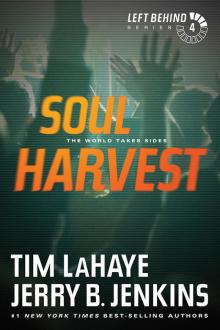 Soul Harvest
Soul Harvest Left Behind Book 13: Kingdom Come The Final Victory
Left Behind Book 13: Kingdom Come The Final Victory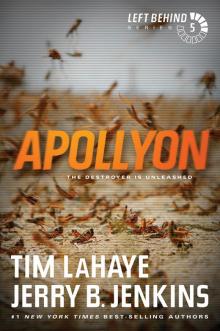 Apollyon
Apollyon 02 Thunder of Heaven: A Joshua Jordan Novel
02 Thunder of Heaven: A Joshua Jordan Novel Glorious Appearing
Glorious Appearing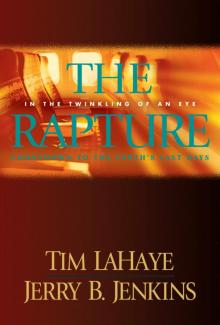 The Rapture: Evil Advances / Before They Were Left Behind
The Rapture: Evil Advances / Before They Were Left Behind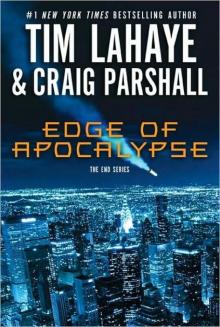 Edge of Apocalypse
Edge of Apocalypse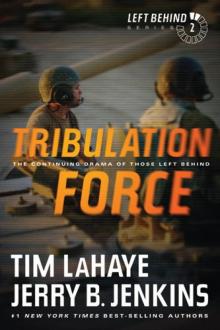 Tribulation Force
Tribulation Force The Left Behind Collection: All 12 Books
The Left Behind Collection: All 12 Books Black Friday
Black Friday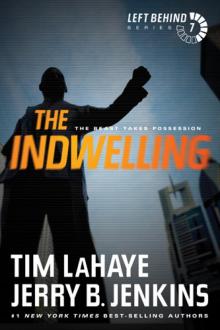 The Indwelling
The Indwelling The Left Behind Collection
The Left Behind Collection